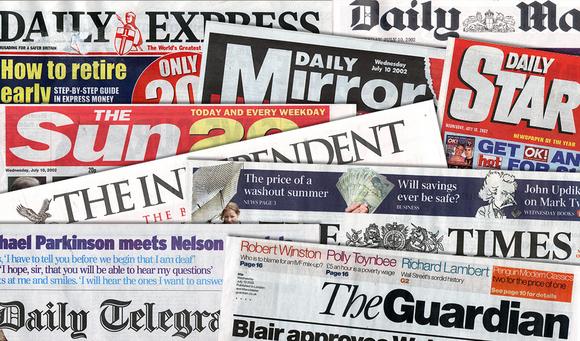Read the text and do the task after it.
 It's common knowledge that newspapers report the news.
Published on a regular basis, usually daily or weekly, they also interpret
events behind the news. In addition, newspapers give useful information, such
as stock market prices, weather reports and television programmes.
It's common knowledge that newspapers report the news.
Published on a regular basis, usually daily or weekly, they also interpret
events behind the news. In addition, newspapers give useful information, such
as stock market prices, weather reports and television programmes.
They are also a popular source of reading for
entertainment. People often buy newspapers for their feature articles on
subjects of wide interest, such as travel and fashion, for their comics and
crosswords, and for their regular columns on topics, such as gardening, eating
out, show business, gossip and astrology. Together with other means of communication,
such as radio, television, and magazines, newspapers form the media. Printed
forms of the media, including newspapers and magazines are also called
"the press".
Newspapers treat the news in two different ways. They
can take a serious line, reporting and explaining the news with the aim of
informing the readers as fully as possible. Alternatively they may take a more
popular approach, which requires more entertainment in the choice and
presentation of stories, photographs and larger eye-catching headlines. Many
newspapers combine the serious and the popular approach, but in the United Kingdom newspapers tend to be
either one thing or the other.
Both serious and popular newspapers can be further
divided into daily or weekly (depending on how often they are published),
morning or evening (depending on when they are published) and local, national,
or, in a very few cases, international (depending on the area over which they
are sold).
Newspapers of general interest are supplemented by
specialist newspapers, which publish news and stories for people with
particular interests. Religious, financial, and sporting newspapers are
examples.
The British are believed to be the greatest newspaper
readers in the world. They read newspapers at breakfast, on the bus or on the
train when they go to work and on the way back home. A symbol of the British
Press is Fleet Street — a street in London that used to be home of most British
national newspapers. Fleet Street is conveniently situated on the north bank of
the River Thames close to a number of large railway stations, which makes it
easy to deliver the papers to the trains taking them round the country. Fleet Street is also not far from such
important British institutions as the Bank of England, the Stock Exchange, the
Houses of Parliament and the Law Courts, which allows the Fleet Street
journalists to keep an eye on things.
British daily papers are published from Monday to
Saturday. The serious or quality papers such as The Times, The Guardian, The Financial Times, The Independent and The Daily Telegraph are for those who
want to know about important happenings everywhere, both domestic news and
foreign news. Compared with Belarusian papers, British quality papers are very thick. They usually consist of
separate sections such as Politics,
Finances, Business, etc. It's not uncommon for a newspaper reader to use
only one or two sections and throw the others away.
Popular papers or tabloids, such as The Daily Mail, The Sun or The Daily Express make a much easier
reading and have a more general readership. Many popular papers run strip
cartoons and humorous drawings, a lot of them have a woman's page, and readers'
letters.
Nearly all papers pay special attention to
sports news. The evening papers, such as The
Evening News are often bought because people want to know the winner of a
race or the result of football pools.
The Sunday papers are not Sunday editions
of the daily papers but separate weekly editions coming out on Sundays. In
addition to the news they usually provide interesting articles on arts,
newly-published books, and gardening. Some of them, such as The Sunday Times have a very high
reputation and the best critics and journalists write for them.
Decide what these words and
word combinations from the text mean and choose the right item.
|
1) common knowledge
|
a)
|
everyone knows it
|
|
|
b)
|
some people know it
|
|
2) feature article
|
a)
|
an especially long article in a newspaper or a
magazine
|
|
|
b)
|
an article about a feature film
|
|
3) comics
|
a)
|
people who are funny
|
|
|
b)
|
set of drawings telling a short story
|
|
4) headline
|
a)
|
a name of a story in a newspaper printed in large letters
|
|
|
b)
|
the first line in a newspaper story
|
|
5) stock exchange
|
a)
|
a place where money is exchanged
|
|
|
b)
|
a place where stocks, bonds and shares are bought
and sold
|
|
6) law court
|
a)
|
a place where people come to hear a law
|
|
|
b)
|
home of a king or a queen
|
|
7) readership
|
a)
|
newspapers and magazines read by the people
|
|
|
b)
|
people who read a newspaper or a magazine
|
|
8) football pool
|
a)
|
a game of football played by local teams
|
|
|
b)
|
a kind of game in which people try to predict the
results of football matches, risking sums of money and getting much bigger if
they guess correctly
|
Комментариев нет:
Отправить комментарий